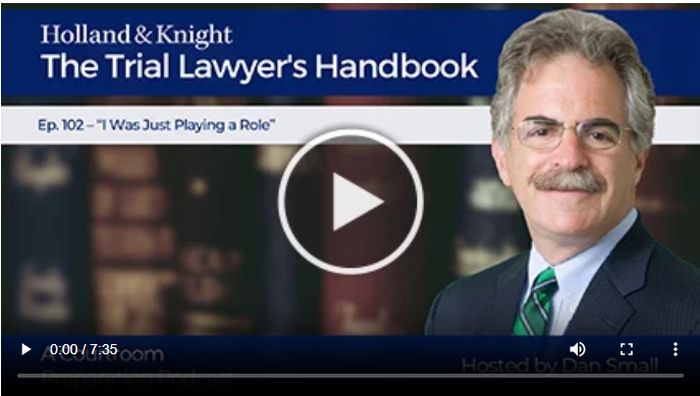- in United States
- within Strategy topic(s)
In this episode of "The Trial Lawyer's Handbook," litigation attorney Dan Small explores the complicated dynamics of using informants in organized crime cases. Drawing from his prosecution of Sam Cammarata, Mr. Small explains how informants can both help and hinder investigations, especially when they manipulate their insider status for personal gain. He discusses the challenges prosecutors face in building persuasive arguments using informant testimony, tactics defense lawyers use to cast doubt on informant credibility and strategies that help reveal the truth in court. This episode offers insights into the delicate balance required to pursue justice when relying on those closest to criminal activity.
Listen to more episodes of The Trial Lawyer's Handbook here.
This podcast episode was adapted from Mr. Small's book Lessons Learned from a Life on Trial: Landmark Cases from a Veteran Litigator and What They Can Teach Trial Lawyers.
Podcast Transcript
Daniel Small: To effectively investigate and prosecute many types of crimes, including organized crime, law enforcement needs to find a way inside the organization. So they rely, in part, on informants: people who are part of or close to the criminal activity but, for various reasons, are willing to provide information. It makes sense. These are often crimes that are planned and committed in secret. Law enforcement needs to be pointed in the right direction, which can only be accomplished through inside information.
Alas, the criminals know that. They know law enforcement needs them. The result is a difficult, sometimes even dangerous, balancing act, with both sides asking, "What's in it for me?" and "What's the other guy doing?" Since the informant game is generally played in secret, it can be subject to deception, mistakes and abuse on both sides. A necessary evil is still an evil, and it has to be handled with great care.
Sam Cammarata, the would-be "Godfather of Houston" whose prosecution we've been discussing in the last couple of episodes, succeeded for a long time by playing three different roles. One role was his position as head of a criminal organization. The second was his cover as a legitimate businessman and family man. But the third was a secret informant, and Sam milked that role for all it was worth. To the question, "What's in it for me?" Sam's answer was, "A lot!" In three acts.
Act One started years before, when Sam was caught carrying drugs. He was able to work a deal with the Drug Enforcement Administration, the DEA, to "work off" his bust by informing on other drug dealers. He did that for several years, until the DEA realized that he was playing them by informing on rivals and then stepping up and taking over their business when they were busted. The DEA was unwittingly helping to expand the Cammarata criminal organization. So they cut him off as an informant. But Sam had discovered that there were benefits to being an informant, if you played it right.
For Act Two, Sam became an informer for the Central Intelligence Agency, the CIA. He touted his questionable international contacts to convince them that he could provide useful information. Of course, he didn't bother to tell them that he had abused his informant role with the DEA and they had kicked him out as a result, nor did he tell the DEA that he'd changed agencies. With the CIA, everything is secretive, so we never really found out what Sam had told them or what he got in return. But the relationship supposedly continued right up until Sam was indicted, which led to the next act.
Act Three was the trial. We indicted Sam and 12 others on a drugs and murder RICO racketeering case. It's not uncommon in criminal cases for the government to try and "work its way up the ladder" to convince underlings in criminal activity to testify against the next rung up the ladder. However, you have to give something to get something, and that can create issues for the testimony of those pointing the finger up the ladder. It's not uncommon for those at the top of the ladder to have insulated themselves from responsibility and then try to use that insulation to attack those trying to point the finger up, claiming things like:
"Oh, they're dishonest criminals. You can't believe them."
"They did these crimes, not me."
"The government bought their testimony against me."
"Where's the evidence I ordered them to do this other than from them?"
If there isn't other evidence corroborating the finger pointer, like tapes or emails or other witnesses, it can be a tough sell for a jury.
Sam took this defense and used his work as an informant to add another layer: "I wasn't really a criminal mastermind. I was just playing a role so I could gather information for the government as an informant. If I don't play the role, I can't get them the information. Now these criminals who actually did all these terrible crimes are pointing the finger at me to get a better deal." After all, no one testified that Sam killed anyone or sold any drugs. They just testified that he ordered them to do it. And he was, indeed, an informant.
At trial, we came at it from three angles. First, showing Sam's history of abusing his informant roles. Second, spending time with our cooperating witnesses to emphasize how Sam led the organization. Third, making it clear that he never told the DEA or the CIA or anybody else about the murders and that they did not and would not authorize him to be involved in such crimes. But it gave the defense something they are often missing in a criminal trial: a motive for his actions, something to talk about. Not an easy fight.
In the end, after a long, hard month of trial, we had developed a great deal of evidence on each of those themes. So in closing argument, I was able to compare the "playing a role" defense to an octopus. I said: "Sam is like an octopus, which, when cornered, exudes a cloud of black ink and tries to slither away. The evidence here allows you, the jury, to see through the defendant's cloud of black ink. Don't let the defendant slither away."
Well, they didn't. Guilty on all charges. "Playing a role" only took him so far. Sentence: 45 years. Sam died in jail some years later.
The content of this article is intended to provide a general guide to the subject matter. Specialist advice should be sought about your specific circumstances.


